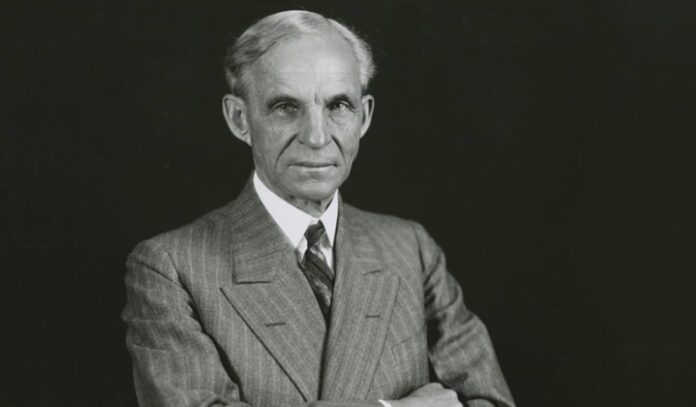Henry Ford, perhaps the most famous industrialist in history, revolutionized the world’s understanding of how factories and plants could operate. He actively introduced what are now commonplace but were then innovative ideas, propelling him to the pinnacle of fame and financial success. Over his lifetime, Henry Ford amassed an incredible fortune, and the concepts he developed are still widely used today.
Facts from Henry Ford’s Biography:
- Birth and Heritage: Henry Ford was born in the United States, but it’s important to note that while his father, William Ford, was born in County Cork, Ireland, his mother, Mary Litogot Ford, was of Belgian descent.
- Early Life: At age 16, Ford left his family farm in Dearborn, Michigan, to work as an apprentice machinist in Detroit, not because he “ran away” but to pursue his interest in machinery. He worked for several companies, including the Detroit Dry Dock Company.
- First Earnings: Ford’s first earnings from repairing farm machinery is a plausible detail, reflecting his early interest in mechanics, though specific documentation is limited.
- First Automobile: At 30, Ford indeed designed and built his first automobile, known as the “Quadricycle,” in 1896. This was done while he was working as an engineer at the Edison Illuminating Company.
- Mechanical Talent: Ford was known for his mechanical skills, though there isn’t a widely known story about him making a wristwatch. He was indeed hands-on in various technical aspects, including architecture, where he designed his home with input from professional architects.
- Assembly Line: The introduction of the assembly line at Ford’s factory in 1913 is one of his most famous contributions, drastically reducing the time it took to build a car and lowering costs.
- Patents: Henry Ford held 161 patents, reflecting his numerous contributions to automotive technology and manufacturing processes.
- Belief in Reincarnation: Ford did express a belief in reincarnation, attributing his understanding of mechanics to experiences from past lives.
- Ford’s Workforce: By the time Ford was in full production in the 1920s, his company had sold millions of cars, including the famous Model T, which became the first affordable automobile for the masses.
- 8-Hour Workday: Ford did indeed introduce the 8-hour workday and doubled workers’ wages to $5 a day in 1914, which was a groundbreaking move that attracted a lot of skilled labor to his factories.
- Conservative Values: Ford was conservative and had specific views on morality, which he imposed on his employees, though the extent of surveillance over their private lives may be exaggerated.
- Famous Quote: The quote about any color “as long as it’s black” is accurate and relates to the Model T, which was primarily available in black due to the quick-drying nature of the black paint, which sped up production.
- Repair Team Payment: Ford implemented innovative management techniques, though the specific anecdote about paying repair crews for inactivity is likely exaggerated or apocryphal.
- Anti-War Sentiment: Ford was a vocal pacifist, famously sponsoring a “Peace Ship” during World War I, which attempted to negotiate peace in Europe.
- Mafia Connections: There’s no significant historical evidence linking Ford directly to the mafia or that he took care of mafia families. This claim appears to be fictional or exaggerated.
- Vegetarianism: Ford did adopt a vegetarian diet later in life, which was part of his interest in health and well-being.
- Electric Vehicles: Ford had an interest in electric vehicles early on, but he ultimately focused on gasoline-powered cars due to the limitations of battery technology at the time.
- Letter from a Car Thief: The story of a letter from a car thief may be apocryphal, and there is no concrete evidence to support this anecdote.
- Anti-Semitism: Unfortunately, it is true that Ford was a known anti-Semite and published a series of anti-Semitic articles. Hitler admired Ford and mentioned him in “Mein Kampf,” but the connection between them was not direct collaboration.
- Charcoal Briquettes: Ford did invent charcoal briquettes as a way to utilize wood scraps from his factories, leading to the creation of the Kingsford charcoal brand.
- Hiring Practices: Ford’s hiring was initially male-dominated, but the company did employ women, especially during wartime when men were drafted into military service.
- Wealth: While Ford was one of the wealthiest individuals in history, estimating his wealth at $188 billion in today’s terms is speculative. It’s challenging to make direct comparisons across time.
- Education: Ford had only a modest formal education but was largely self-taught and incredibly resourceful, contributing to his success.
